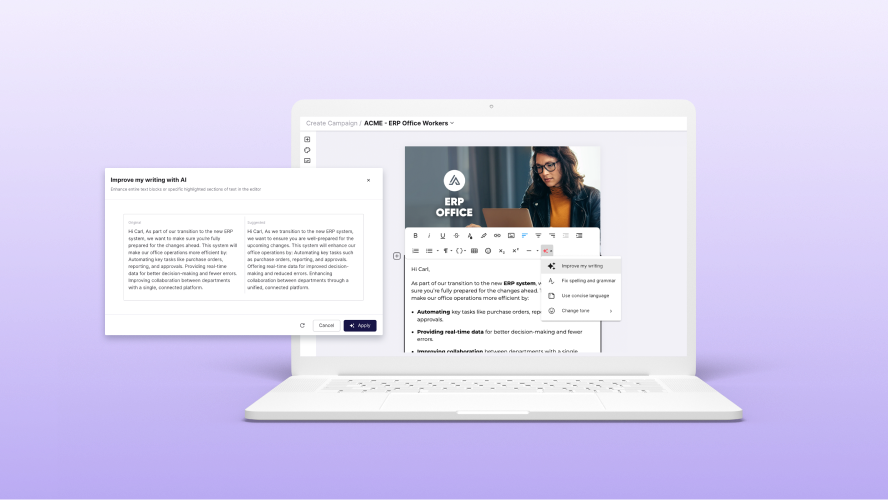Table of Contents
A strong employee value proposition (EVP) is the key to recruiting and keeping top talent. It first begins with a company’s employees, or rather their experience working for the company.
Factors such as salary, benefits, training opportunities, stock values, a company’s brand value and leadership quality all play a role in the total value proposition.
What is it that you’re offering to employees that keep them motivated and engaged with your business? What benefits are you providing them to improve their quality of life? These are the questions prospective and current employees are asking. After all, 79% of employees who quit their jobs cite a lack of appreciation as a key reason. Just as with a product, designers and engineers craft the best value for its users, the same goes for a company and the experience it provides its employees. In other words, what is your why?
Belonging drives engagement
“We are focused on making employees feel like they belong, and that they are a part of the mission. Being able to actually see who is engaging with what content, who are our most engaged employees, is big.”
A number of different factors contribute to having a strong EVP, and some companies perform these better than others. Companies that are able to stay connected to their employees and keep them engaged and happy exude a strong culture both internally and externally to the company. The alignment with both their external brand messaging and their internal culture plays a huge role in the trust you build with your employees.

Here are some ways companies who have successful EVPs operate:
- Communicating company core values: Consistency in communication is key in any strategy, but when it comes to communicating your employee value proposition—this is a critical element. When you have an entire fleet of employees who are sharing their company experience (no matter if you asked them or not), it is important that what they say is aligned to your brand. Make sure your company values are visible to everyone and integrated in your day-to-day. The more exposure your values have, the more they’ll be naturally embedded in conversations with employees.
- Effective leadership: Executives can’t just talk the talk, they need to walk the walk. For example, if diverse perspectives is a core component of your values, you need to have a leadership that actually listens to unique perspectives. This can’t just be lip service. A company’s EVP can quickly lose credibility if employees see that it is poorly aligned with the behavior of your C-level suite.
- Flexible culture: As markets fluctuate and the world continues to strike up new ways of living and working, it’s important that leadership maintain flexibility. 29% of employees say that better work/life balance is one of the most important factors in accepting a new job. Employees want a company culture that evolves with the times. Right now, remote work is growing and employees need the right support and tools to maintain a healthy balance between working and home. If your company continues to come up with ways they can be supported, this will increase your EVP.

- Recognition: A job well done deserves acknowledgment. But one-off, fleeting compliments won’t do. If recognition is going to work, it needs to be authentic and integrated into the fabric of your company culture. Create an environment of celebrating wins for each other and make sure that managers and executives are the ones leading the charge. If leadership consistently recognizes their employees for doing a great job, then more people will be motivated to work harder.

The reality is that creating an effective employee value proposition is an ever-evolving process. You need a team that is open-minded and thinks ahead to the future, not just for what your company needs, but also what your employees will want.
No matter the ways in which you build your employee value proposition, it’s important to make them incredibly clear to both your existing and prospective employees. If you have a set of core company values, build out your list of employee offerings from that so they are grounded in something concrete. Determine which channels will be most effective in continuing this dialogue of employee value and make sure you have a feedback loop where employees can validate that what you’re offering is actually meaningful to them.
Deliver a hyper-personalized employee experience at scale
Table of Contents
Related posts
Subscribe via Email
Subscribe to our blog to get insights sent directly to your inbox.
Related posts

Sign up to receive the latest news and resources from Firstup
Firstup delivers personalized communication and data insights to improve the employee experience at every moment that matters





